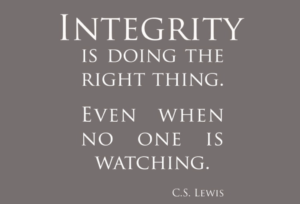Blog
The Importance of Integrity in the Life of an Insurance Adjuster
- August 3, 2021
- Posted by: April Hilbert
- Category: Adjuster Licensing Best Practices

The importance of having honesty and integrity as an insurance adjuster cannot be overstated. First let’s just unpack the concept of “Integrity”. A quick Google search tells us that:
“Integrity is the practice of being honest and showing a consistent and uncompromising adherence to strong moral and ethical principles and values. In ethics, integrity is regarded as the honesty and truthfulness or accuracy of one’s actions.”
But the most interesting definition from Webster’s dictionary is: “the state of being whole and undivided.”
Let that sit with you a minute. What would that mean to you to be whole and undivided? Maybe it means your insides and outsides match. That who you are when no one is looking is also who you are when everyone is watching. Maybe to you it means you won’t break off or compromise even a part of yourself, because then you would not be whole.
As an insurance adjuster, you have clear objectives and goals. Compromising those will divide your focus and jeopardize your career and your integrity.
There are claims practices acts and/or codes of ethics governing each state that adjusters must adhere to and, in many states, classes on the topic of ethics that must be taken. But above that knowledge, the indicator of whether you are crossing lines? Greed. Anytime you find yourself focused on the money over the service, you have lost your way. Even if you find yourself surrounded by money-centric persons and not service-centric persons, you are at higher risk of temptation. You may think that won’t be an issue for you, but something people rarely tell you is how many legitimate temptations will come to you as an adjuster… things that come along that tempt you to compromise your integrity.
You must determine before you set foot on the field what you will say no to. That way, the “no” comes easier. Make these decisions ahead of time.
 Integrity is what you do when no one is watching. There will be ample times when you are working that no one is watching you. Imagine that you find yourself in a disaster area surrounded by contractors. It’s helpful to build relationships with contractors and maybe you need to borrow a ladder to get a better look. But you have to know when that relationship becomes a conflict of interest. What happens when contractors offer you money in exchange for a warm lead introduction to the homeowner? Or to give you money based on the amount of damage you find?
Integrity is what you do when no one is watching. There will be ample times when you are working that no one is watching you. Imagine that you find yourself in a disaster area surrounded by contractors. It’s helpful to build relationships with contractors and maybe you need to borrow a ladder to get a better look. But you have to know when that relationship becomes a conflict of interest. What happens when contractors offer you money in exchange for a warm lead introduction to the homeowner? Or to give you money based on the amount of damage you find?
Remember, you are there to do a job. To settle a claim successfully. To balance the interests of the policyholder or claimant and the insurance carrier that you represent. These are distractions against your overall objective and goal as an adjuster. You also have to realize that eventually this behavior will catch up to you and can devastate your life.
Here are few ways to avoid this:
- Know your state’s Fair and Unfair Claims Practices Acts and, if applicable, Code of Ethics.
- Decide before an opportunity presents itself how you will respond.
- Make it clear to the insured your role and that you have no relationship to the contractor.
- Keep your moral compass intact.
The most successful adjusters in the business are those that have never compromised their integrity. Keep service as your focus and maintain honesty and transparency. You will find long-term success if you stay whole and undivided.
